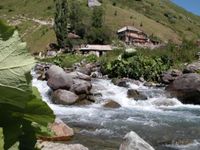Press release of the Ministry of Foreign Affairs of the Republic of South Ossetia
The President of the Republic of South Ossetia, members of the government, public figures, political scientists, experts and journalists were invited to the round table.
Dmitriy Medoev, the Minister of Foreign Affairs of the Republic of South Ossetia, took part in the work of the round table and made a report on the theme “South Ossetia on Way to Recognition: Realities of the Political Development”.
In particular, the Minister stated:
“At the very beginning I would like to mark the important provision that Georgia has never had and still has no legal or other grounds to consider South Ossetia as its territory. Ossetia has never been a part of Georgia, except for the Bolshevist period (1921 – 1990), when its southern part was forcibly included in the GSSR.
The struggle of the people of South Ossetia for national self-determination in 20th years of the 20th century, which excluded division of Ossetia, was followed by a bloody terror from the government of Georgia. Under the new governance, upon the decision of the Caucasian Bureau of the Bolshevik party, contrary to the will of its people, South Ossetia was included in structure of the Soviet Georgia. Naturally, that resolution was illegitimate and couldn't have legal ground, as it was only a decision of a party body.
However, even that decision was never recognized by the population of South Ossetia in times of the abusive stay in Soviet Georgia. Numerous protests made by Ossetian intellectuals and the people of South Ossetia in 1926, 1934, 1944, 1949, 1958, 1974 as well as the repressions following them demonstrate that fact.
In 1989 - 1992 the aggression of Georgia has been stopped thanks to mass resistance of the whole population of South Ossetia with the help of North Ossetia and the fraternal support from the people of the North Caucasus. Only active diplomatic and military interference of Russia stopped the bloodshed in July, 1992.
For 12 years after signing of the Sochi agreements and achievement of ceasefire in South Ossetia, relative stability remained despite certain difficulties, and the Trilateral Joint Peacekeeping Forces acted as the main guarantor of this stability.
However with the regime of Saakashvili coming to power, the situation has promptly begun to change. A mere war with massive shell attacks on settlements and large-scale military operations was waged against South Ossetia in July-August, 2004. South Ossetia, however, stood once again. The failed military adventure of Saakashvili’s hawks showed the true face of the Tbilisi regime, which was presented in Europe as an example of democracy.
It had to be clear to the international community that any attempts to change the developed state of affairs and to impose the Tbilisi regime on South Ossetia would lead only to bloodshed and aggravation of the existing problems.
The attempts made by Tbilisi to return to the borders of the Georgian SSR have no chances. The wars unleashed by the governments of Georgia in 1990 - 1992, August 2004 and especially in 2008 have led to final decision on proclaiming the independence of South Ossetia. Saakashvili's regime has finally and irrevocably excluded for all South Ossetians the possibility of co-residence with Georgia.
That thesis, which excluded separation of the Ossetian nation, was put forward in early 1990’s at the height of Georgian nationalism. It was legally fixed by the results of the referendums of 1992 and 2006. Then more than 90% of the population of the Republic supported the independent way of development of the state.
Results of those historical referendums have formed the basis of the Decree of the President of the Russian Federation No. 1261, dated August 26, 2008:“Taking into consideration the will of the people of South Ossetia, the Republic of South Ossetia is recognized as a sovereign and independent state”.
Every August 8 we commemorate the tragic date of the anniversary of the treacherous attack of troops of the Tbilisi regime on South Ossetia. Without any doubt that event would remain in the memory of our people as the most dark, notorious period of our history, since it was the year of the greatest losses for our nation.
At the same time we consider year 2008 as the year of recognition of statehood of the Republic. Therefore, August 26 is legitimately a national holiday. It is our Victory Day!
It is a cause for regret that representatives of the updated political elite of modern Georgia can't get rid of the recurrence of imperial thinking.
Currently the process of militarization of neighboring Georgia, and pulling it to NATO is being run. It is obvious that these provocations have distant purposes and could end in outbreak of another war.
Exercising the right of a nation to self-determination and statehood is the highest form of human civilization based on general equality and mutual respect of all people for each other’s rights.
It is well-known that the international law acknowledges the possibility of self-determination though formation of a separate state. However, as practice of international relations shows, this norm is often carried out in accordance with the principle that “might is right”; one standard is applied on the Eastern Timor, Montenegro, Kosovo, and other standard is forced on South Ossetia, Abkhazia, Nagorno-Karabakh.
South Ossetia refused of such an approach and was ready for recognition of its independence by the international community and, first of all, by Russia, the state whose history and mentality is familiar to ours.
We in South Ossetia will always remember the determination of Russian authorities in making decisions, which were vital for us.
The people of South Ossetia are grateful to ordinary Russian citizens for the support, sincere sympathy and assistance, rendered in the most difficult days of August 2008”.
Tskhinval, August 25, 2017

